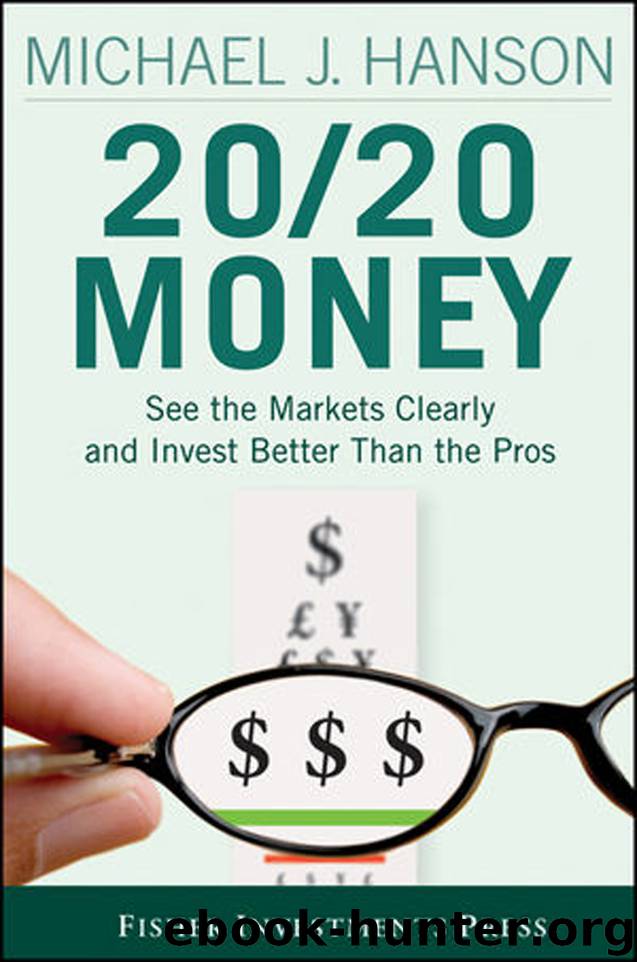2020 Money: See the Markets Clearly and Invest Better Than the Pros by Michael Hanson

Author:Michael Hanson
Language: eng
Format: epub
Tags: Personal & Professional Development
ISBN: 9780470285398
Publisher: John Wiley & Sons
Not Drunk, Just Buzzed
Particularly in the short term, markets tend to stagger up and down charts like a guy staggering home after a few too many—zig-zagging along without any real direction. That is, there is the appearance of randomness. Maybe, but more than likely the market is doing something you cannot see or currently fathom.
A common investor mistake about markets is the belief in linearity. Most of the time, CEAS cannot be understood via linear logic. Many believe in their gut there has to be a discernible cause and effect for everything—a precedent action to every observed reaction. It's Newton's third law for goodness sake! This is taken as such dogma, most forget to ever question the premise or what it really applies to.
We've visited the problems of math and reductionist thinking many times already in this book. The belief in action/reaction and cause/effect comes from an erroneous belief that CEAS should work in the same ways basic physical science works. For whatever reason, over the years, investors and economists think we ought to be able to deduce market movements the same way we calculate stuff like gravity, velocity, and acceleration. That's probably because we want to believe mathematics somehow contains concrete and precise answers for everything. It seems intuitive—like we're making it all "scientific"—but if you understand how CEAS works, it simply cannot be. Linear reasoning and mathematics will often fail.
With CEAS (stock markets and economies) there is no requirement of linear cause and effect. Seems like blasphemy! But it's true. Daily journalists and pundits try to explain "why" stocks did what they did. If you watch those explanations for just a few days you'll see how contradictory they are. One day stocks are up because oil is lower, which is supposedly good for consumers. Then the next day, stocks are up because oil is higher, indicating high demand for energy, which points to a more robust economy. Hogwash, all of it! It's trying to assign causality where causality isn't discernible or even necessarily possible.
If you think about it, a well-functioning CEAS should rarely produce an easily predictable result. Things are dynamic and evolve because of competition and the struggle for survival (again, something nature and free market capitalism have in common). Thus, one could argue evolving systems must be inherently unpredictable because if they were predictable, they'd be gamed very quickly and everyone would get rich. Just so, organisms that are easily understood are easily hunted and become extinct very quickly.
Download
This site does not store any files on its server. We only index and link to content provided by other sites. Please contact the content providers to delete copyright contents if any and email us, we'll remove relevant links or contents immediately.
| Budgeting & Money Management | College & Education Costs |
| Credit Ratings & Repair | Retirement Planning |
The Compound Effect by Darren Hardy(8885)
Tools of Titans by Timothy Ferriss(8322)
Nudge - Improving Decisions about Health, Wealth, and Happiness by Thaler Sunstein(7669)
Win Bigly by Scott Adams(7149)
Deep Work by Cal Newport(6976)
Rich Dad Poor Dad by Robert T. Kiyosaki(6536)
Principles: Life and Work by Ray Dalio(6308)
Pioneering Portfolio Management by David F. Swensen(6264)
The Barefoot Investor by Scott Pape(5723)
Digital Minimalism by Cal Newport;(5718)
Grit by Angela Duckworth(5561)
The Slight Edge by Jeff Olson(5386)
Discipline Equals Freedom by Jocko Willink(5338)
The Motivation Myth by Jeff Haden(5181)
You Are a Badass at Making Money by Jen Sincero(4899)
The Four Tendencies by Gretchen Rubin(4580)
Eat That Frog! by Brian Tracy(4486)
The Confidence Code by Katty Kay(4224)
Bullshit Jobs by David Graeber(4150)
